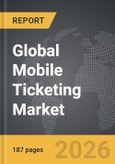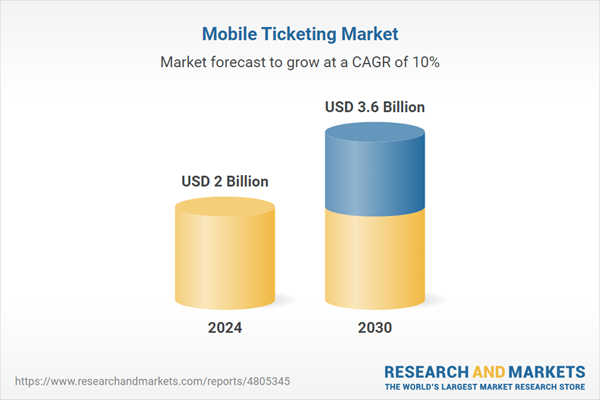Global Mobile Ticketing Market - Key Trends & Drivers Summarized
How Is Mobile Ticketing Redefining Consumer Access to Events and Transit?
Mobile ticketing systems revolutionize how consumers access transportation and events, offering a seamless, more efficient, and eco-friendly alternative to traditional paper tickets. By leveraging smartphones and other mobile devices, users can purchase, store, and validate tickets electronically, which not only speeds up the entry process but also reduces the chances of lost or forgotten tickets. This technology is being increasingly implemented in public transport systems, airlines, and entertainment sectors, where quick and secure processing of large volumes of tickets is critical. The convenience of mobile ticketing, including the ability to select seats, check availability, and even receive last-minute discounts, enhances the user experience, fostering greater customer satisfaction and retention.What Technological Advances Are Propelling the Mobile Ticketing Industry?
The mobile ticketing industry is propelled by several technological advancements that ensure the security and efficiency of transactions. Developments in near-field communication (NFC) and QR code technology have streamlined the validation process, making it faster and more reliable. Enhanced mobile broadband connectivity and the proliferation of smartphone usage provide a robust platform for mobile ticketing solutions to flourish. Additionally, the integration of mobile payment systems, like Apple Pay and Google Wallet, with mobile ticketing apps has simplified the purchasing process, allowing users to conduct secure transactions within a single application. These technological enhancements not only improve user convenience but also drive down operational costs for service providers.Which Sectors Are Experiencing the Highest Adoption Rates of Mobile Ticketing Solutions?
The adoption of mobile ticketing solutions is particularly high in the public transportation sector, where rapid and secure processing of tickets is essential. Urban transit systems such as buses, trains, and subways are integrating mobile ticketing to improve passenger flow and reduce congestion during peak hours. The entertainment industry, including cinemas, concerts, and sports events, is also leveraging mobile ticketing to enhance event access and streamline entry management. Moreover, the aviation industry is seeing a shift towards mobile boarding passes, which is part of a broader move towards digitization aimed at improving passenger experience and operational efficiency.What Drives the Growth in the Mobile Ticketing Market?
The growth in the mobile ticketing market is driven by several factors, including the widespread adoption of smartphones and increased internet penetration across the globe. As more consumers move towards digital solutions for everyday activities, the demand for mobile ticketing options continues to rise. Additionally, the push towards smart cities and the digital transformation of public services, including transportation, fuel the adoption of mobile ticketing systems to enhance urban mobility and accessibility. Environmental concerns also play a significant role, as mobile ticketing is a more sustainable option compared to traditional paper-based systems. Lastly, improvements in security technologies that protect users' financial and personal data are crucial in promoting the adoption of mobile ticketing solutions, ensuring the market's expansion and longevity.Report Scope
The report analyzes the Mobile Ticketing market, presented in terms of market value (USD). The analysis covers the key segments and geographic regions outlined below.- Segments: Technology (NFC, Barcodes & QR Codes, Other Technologies); End-Use (Transportation, Entertainment, Hospitality, Other End-Uses).
- Geographic Regions/Countries: World; United States; Canada; Japan; China; Europe (France; Germany; Italy; United Kingdom; and Rest of Europe); Asia-Pacific; Rest of World.
Key Insights:
- Market Growth: Understand the significant growth trajectory of the NFC Technology segment, which is expected to reach US$1.7 Billion by 2030 with a CAGR of 9.9%. The Barcodes & QR Codes Technology segment is also set to grow at 10.4% CAGR over the analysis period.
- Regional Analysis: Gain insights into the U.S. market, valued at $575.6 Million in 2024, and China, forecasted to grow at an impressive 9.4% CAGR to reach $550.2 Million by 2030. Discover growth trends in other key regions, including Japan, Canada, Germany, and the Asia-Pacific.
Why You Should Buy This Report:
- Detailed Market Analysis: Access a thorough analysis of the Global Mobile Ticketing Market, covering all major geographic regions and market segments.
- Competitive Insights: Get an overview of the competitive landscape, including the market presence of major players across different geographies.
- Future Trends and Drivers: Understand the key trends and drivers shaping the future of the Global Mobile Ticketing Market.
- Actionable Insights: Benefit from actionable insights that can help you identify new revenue opportunities and make strategic business decisions.
Key Questions Answered:
- How is the Global Mobile Ticketing Market expected to evolve by 2030?
- What are the main drivers and restraints affecting the market?
- Which market segments will grow the most over the forecast period?
- How will market shares for different regions and segments change by 2030?
- Who are the leading players in the market, and what are their prospects?
Report Features:
- Comprehensive Market Data: Independent analysis of annual sales and market forecasts in US$ Million from 2024 to 2030.
- In-Depth Regional Analysis: Detailed insights into key markets, including the U.S., China, Japan, Canada, Europe, Asia-Pacific, Latin America, Middle East, and Africa.
- Complimentary Updates: Receive free report updates for one year to keep you informed of the latest market developments.
Some of the 28 companies featured in this Mobile Ticketing market report include:
- Ace Ticket Worldwide, Inc.
- Alliance Tickets Inc
- Coast To Coast Tickets LLC
- Helpshift, Inc
- Location Sciences Group Plc
- Masabi Ltd.
- Razorgator LLC.
- StubHub, Inc.
- Zendesk, Inc.
This edition integrates the latest global trade and economic shifts into comprehensive market analysis. Key updates include:
- Tariff and Trade Impact: Insights into global tariff negotiations across 180+ countries, with analysis of supply chain turbulence, sourcing disruptions, and geographic realignment. Special focus on 2025 as a pivotal year for trade tensions, including updated perspectives on the Trump-era tariffs.
- Adjusted Forecasts and Analytics: Revised global and regional market forecasts through 2030, incorporating tariff effects, economic uncertainty, and structural changes in globalization. Includes historical analysis from 2015 to 2023.
- Strategic Market Dynamics: Evaluation of revised market prospects, regional outlooks, and key economic indicators such as population and urbanization trends.
- Innovation & Technology Trends: Latest developments in product and process innovation, emerging technologies, and key industry drivers shaping the competitive landscape.
- Competitive Intelligence: Updated global market share estimates for 2025, competitive positioning of major players (Strong/Active/Niche/Trivial), and refined focus on leading global brands and core players.
- Expert Insight & Commentary: Strategic analysis from economists, trade experts, and domain specialists to contextualize market shifts and identify emerging opportunities.
Table of Contents
Companies Mentioned (Partial List)
A selection of companies mentioned in this report includes, but is not limited to:
- Ace Ticket Worldwide, Inc.
- Alliance Tickets Inc
- Coast To Coast Tickets LLC
- Helpshift, Inc
- Location Sciences Group Plc
- Masabi Ltd.
- Razorgator LLC.
- StubHub, Inc.
- Zendesk, Inc.
Table Information
| Report Attribute | Details |
|---|---|
| No. of Pages | 187 |
| Published | February 2026 |
| Forecast Period | 2024 - 2030 |
| Estimated Market Value ( USD | $ 2 Billion |
| Forecasted Market Value ( USD | $ 3.6 Billion |
| Compound Annual Growth Rate | 10.0% |
| Regions Covered | Global |









